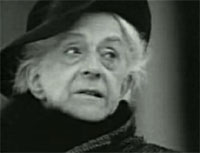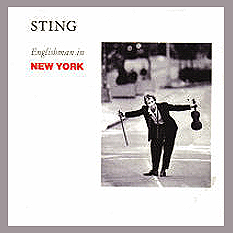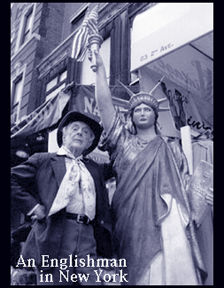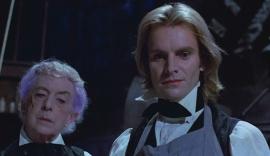"Quentin's a friend of mine and someone I admire greatly because I think he's one of the most courageous people I've ever met. He has lived his life in an individual way in a society that is vicious and malevolent. But he is a hero in a feminine way. So that's a song about the feminine qualities than can exist in man without being negative." ~ Timeout, October 1987
"The song is about someone else. It's about Quentin Crisp. I think he is one of the most courageous men I've ever met, and one of the wittiest He was flamboyantly gay at a time when it was physically dangerous to be gay. He lives near the Bowery, and he has an unbelievable sense of humour and joy in life that everybody can draw a lesson from.  It was my song to appreciate his singularity. But it's about me, too. It's very important for any kind of writer to have a period in exile. One, it makes you see the country you're in a little clearer than the people there see it. Two, it makes you see the place you come from a little clearer. And I do regard myself as an exile. I've chosen to live in New York for the past two years because of the musicians I play with, because I find it inspiring, because I meet interesting people much more easily than I do in London. It's less phobic here. At the same time, I know I'm not an American citizen. There are certain things about America that terrify me - its foreign policy, religion - and there's a lot about America that I love. But I'm not assimilated. I don't want to belong anywhere. I come from a place I'm proud to come from. That's almost enough. To settle down somewhere for me seems to equate with a sense of decay." ~ Rolling Stone, February 1988
It was my song to appreciate his singularity. But it's about me, too. It's very important for any kind of writer to have a period in exile. One, it makes you see the country you're in a little clearer than the people there see it. Two, it makes you see the place you come from a little clearer. And I do regard myself as an exile. I've chosen to live in New York for the past two years because of the musicians I play with, because I find it inspiring, because I meet interesting people much more easily than I do in London. It's less phobic here. At the same time, I know I'm not an American citizen. There are certain things about America that terrify me - its foreign policy, religion - and there's a lot about America that I love. But I'm not assimilated. I don't want to belong anywhere. I come from a place I'm proud to come from. That's almost enough. To settle down somewhere for me seems to equate with a sense of decay." ~ Rolling Stone, February 1988
"Well, it's partly about me and partly about Quentin. Again, I was looking for a metaphor. Quentin is a hero of mine, someone I know very well. He is gay, and he was gay at a time in history when it was dangerous to be so.  He had people beating up on him on a daily basis, largely with the consent of the public. Yet, he continued to be himself. He is funny and witty and utterly singular. He lives in New York too, in the Bowery, and dares to walk the streets. I didn't just want to be writing about myself as an alien. I wanted to write about Quentin, someone I admire. So it's not really about being gay. It's about being yourself, never conforming. That's what the song is really about." ~ Rock Express, 1988
He had people beating up on him on a daily basis, largely with the consent of the public. Yet, he continued to be himself. He is funny and witty and utterly singular. He lives in New York too, in the Bowery, and dares to walk the streets. I didn't just want to be writing about myself as an alien. I wanted to write about Quentin, someone I admire. So it's not really about being gay. It's about being yourself, never conforming. That's what the song is really about." ~ Rock Express, 1988
"One of my favourite little jokes is from an 'Englishman In New York', where at one point we're playing 'God Save The Queen' in a minor key. It really tickles me but nobody else hears it!" ~ Guitar, April 1996
"It's about Quentin Crisp. He's one of the most charming, witty and courageous men I know. He was openly gay not only when it was dangerous, but when it was against the law.  Then he moved to the Bowery, this tough neighbourhood in New York, when he was 71. The song has exactly the same chords as 'If You Love Somebody Set Them Free'. If you find a good chord structure you should use it at least once or twice. I tried to capture the multicultural elements of the music in New York. You hear jazz on one block and rock on the next, then someone comes round the corner with hip-hop blaring out of their car. That's why those hip-hop drums burst in for a few bars. The record company tried to talk me out of that; but I said, "No; that's what it's about." I think Quentin rather likes the song. He calls me Mr Sting." ~ Independent On Sunday, November 1994
Then he moved to the Bowery, this tough neighbourhood in New York, when he was 71. The song has exactly the same chords as 'If You Love Somebody Set Them Free'. If you find a good chord structure you should use it at least once or twice. I tried to capture the multicultural elements of the music in New York. You hear jazz on one block and rock on the next, then someone comes round the corner with hip-hop blaring out of their car. That's why those hip-hop drums burst in for a few bars. The record company tried to talk me out of that; but I said, "No; that's what it's about." I think Quentin rather likes the song. He calls me Mr Sting." ~ Independent On Sunday, November 1994
"I like music to have a lot of references. They're there deliberately, as clues. For example, on 'Englishman in New York', Branford plays 'God Save the Queen' in a minor key at one point. I think that's really what an audience would want. I hope. A sophisticated audience. Rather than just, 'This song is about sex.' That's fine, but is there something underneath that?" ~ The Baltimore Sun, March 1996
To read the lyrics, click here!



